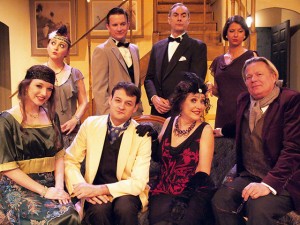Hay Fever
Ho-hum Hay
Cast can’t capture Noel Coward’s comedic magic
Theatre Downtown, Orlando, Florida
From The Orlando Weekly, February 26, 2014
Noel Coward, one of England’s most prolific playwrights, first brought Hay Fever to the stage in 1925. Though the play seems almost as fresh today, its quintessentially British brand of farce has become problematic, especially for American performers, because of changing tastes and styles. And though the actors in the latest Theatre Downtown production display the necessary freneticism, they simply can’t do justice to Coward’s concoction.
This is the story of the ironically named Blisses, who occasionally experience bliss for themselves, if only through their self-absorption, but who suck bliss from everyone else. The matriarch of the family is Judith, a retired actress now resigned to perform her melodrama to her living-room furniture. Only slightly less pathetic is her husband, David, a novelist who spends his time holed up in his study, ignorant of his wife’s philandering. (My husband’s “not dead,” Judith tells her fling. “He’s upstairs.”) Rounding out this familial fracas are daughter Sorel and son Simon, one mental step removed from their perambulators.
Unbeknownst to the other family members, each Bliss has invited a guest to the house for the weekend. Judith hopes to score, or at least feed her ego, with Sandy, a young, sporty groupie of hers, while David is expecting a visit from a flighty flapper, Jackie, from whom he hopes to draw literary, and perhaps carnal, inspiration. Simon fancies Myra, a vamp who “uses sex as a sort of shrimping net,” and Sorel hopes to hang with Richard, a respectable and much older, yet clueless, acquaintance. Though each Bliss occasionally feigns desperate love for one of these guests – and usually not the guest that he or she has invited – the four visitors mean nothing to them except passing fancies, producing the perfect opportunity for situational farce, with a dash of social commentary.
The play’s description belies its difficulty, and, regrettably, the screwball comedy, pacing and tone of Hay Fever lie just beyond the actors’ reach. Vera Varlamov, as Myra, projects a strong, sexy charisma, as does Rachel Comeau, as Sorel. Cira Larkin, as Judith, also has her memorable moments and sometimes seems the most natural fit for her role, while Pamela Stone, as Jackie, is often sweet and funny. But a Coward comedy requires the entire ensemble to gel, and this company, particularly the men, can’t keep it together.
Mike McRee’s set and Fran Hilgenberg’s costumes are superb, and, along with some period background music, do a good job of transporting us to the 1920s. But then come the dialects, which, more than any other factor, doom the production. Even the best among the cast are mediocre, with not a single one consistently nailing the famous “ahh” of “can’t” and “dance” that the Standard British sound demands. And then there’s David Lee Bass as David, who doesn’t even seem to be trying, and Ava Tunstall as Clara the housekeeper, who creates an odd blend of General American, Cockney, Yorkshire and Hampshire. Dick Van Dyke would be proud.
Despite an experienced director in Tom Larkin, a sporadically competent cast and a wildly energetic second act, Fever never quite catches fire.
© 2014 Orlando Weekly / MeierMovies, LLC
